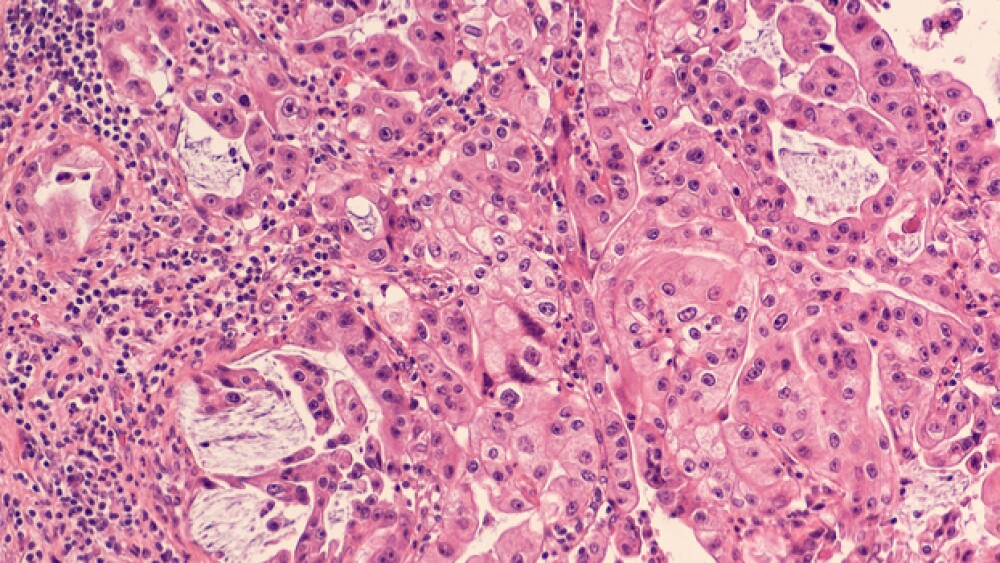The company provided an update on its Phase III trial of Imbruvica in combination with chemotherapy compared to placebo in metastatic pancreatic adenocarcinoma.
AbbVie’s Imbruvica flunked its pancreatic cancer trial. The company provided an update on its Phase III RESOLVE clinical trial of Imbruvica (ibrutinib) in combination with chemotherapy compared to placebo in metastatic pancreatic adenocarcinoma.
The trial is comparing Imbruvica in combination with nab-paclitaxel and gemcitabine compared to placebo in combination with the two chemotherapies. Patients were split evenly into each group. At the end of the study, Imbruvica plus chemotherapy did not meet the primary endpoint of improved progression-free survival (PFS) or overall survival (OS).
Imbruvica is a first-in-class Bruton’s tyrosine kinase (BTK) inhibitor developed together by AbbVie and Pharmacyclics, an AbbVie company, and Janssen Biotech, a Johnson & Johnson company. Imbruvica has been on the market in the U.S. since 2013 and is approved by the U.S. Food and Drug Administration (FDA) for five B-cell blood cancers, and also for chronic graft-versus-host disease for a total of nine FDA-approved indications.
Metastatic pancreatic cancer is aggressive and difficult to treat. The American Cancer Society estimates that in 2019 there will be about 56,770 people in the U.S. diagnosed with pancreatic cancer, and approximately 45,750 will die of the disease.
“We continue to evaluate the potential of Imbruvica as a cancer treatment alone or in combination for a variety of cancer types,” stated Danella James, Head of Clinical Science at Pharmacyclics. “We are passionately advancing our robust ibrutinib scientific development program to continue to advance cancer standards of care, particularly in areas that have an unmet medical need.”
On January 3, AbbVie announced it had signed a global, strategic collaboration with South San Francisco-based Tizona Therapeutics. Together the companies will work to develop and commercialize CD39-targeted therapeutics, including TTX-030, a first-in-class antibody for cancer.
Under the deal, AbbVie paid Tizona $105 million up front for the exclusive option to license the CD39 program including TTZX-030. AbbVie also made an equity investment in Tizona. Tizona will head clinical development through the end of Phase Ib trials, where AbbVie will then have an option to lead global development and commercialization. Tizona holds on to the option to co-develop and co-promote in the U.S. and is eligible for various development and commercial milestones, as well as tiered royalties on net sales.
TTX-030 is a monoclonal antibody designed to inhibit the activity of CD39, a cell surface enzyme upregulated on a variety of tumor cells, exhausted T-cells, in addition to many suppressive cell types.
“Immuno-oncology is one of AbbVie’s key focus areas in our mission to discover and develop medicines that drive transformational improvement in cancer treatment,” stated Mo Trikha, vice president, Head of Oncology Early Development at AbbVie. “Exploring the tumor microenvironment as a source of targets that can be modulated to inhibit cancer growth holds tremendous promise. The Tizona team has generated compelling preclinical data for their TTX-030 program, and we look forward to a productive collaboration focused on rapidly advancing this novel first-in-class antibody.”
Courtney Beers, vice president of Immunology at Tizona, noted, “Tumors employ various strategies to create a tolerogenic microenvironment, which reduces the immune system’s ability to detect and fight cancer. Preclinical research shows that inhibiting CD39 may hold the key to restoring and bolstering immune responses against tumors. In AbbVie, we have a partner who shares our passion for science and commitment to delivering breakthrough innovation to patients with cancer. We look forward to advancing this exciting program.”





